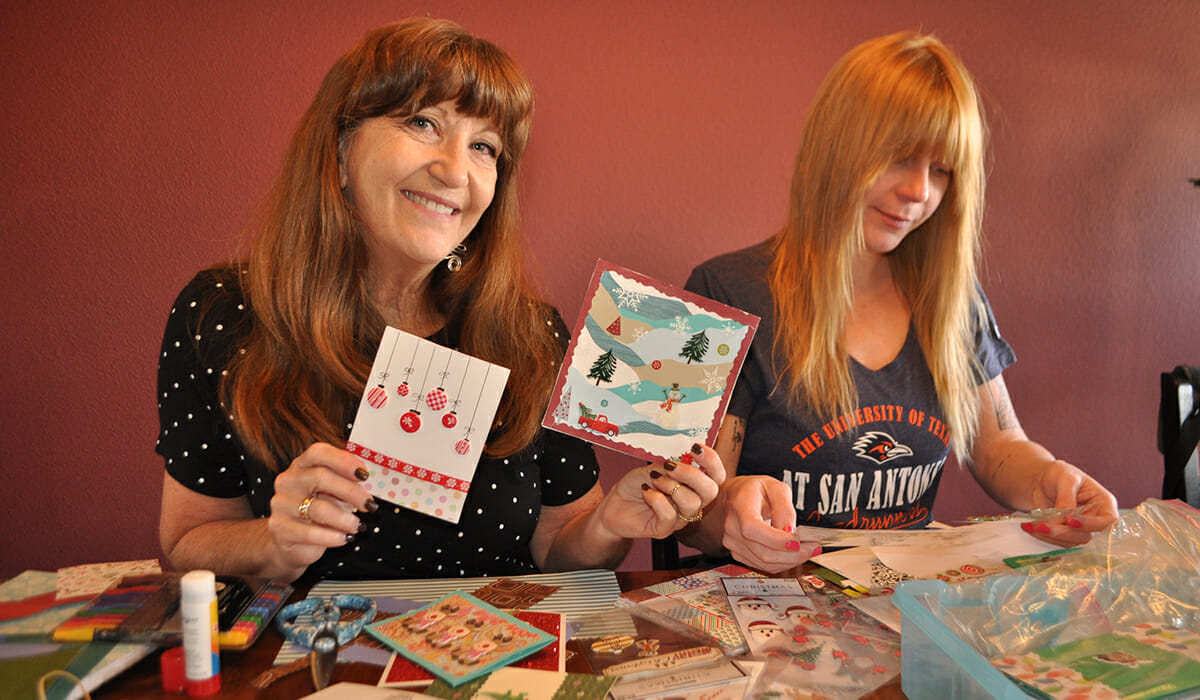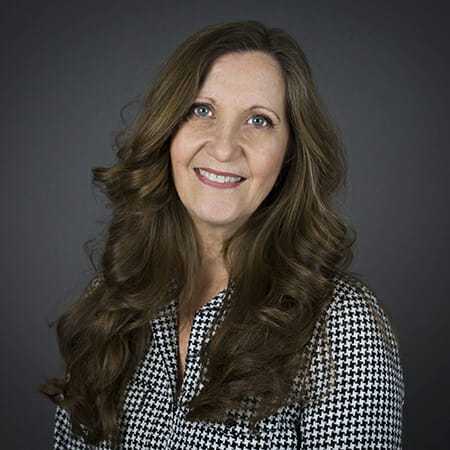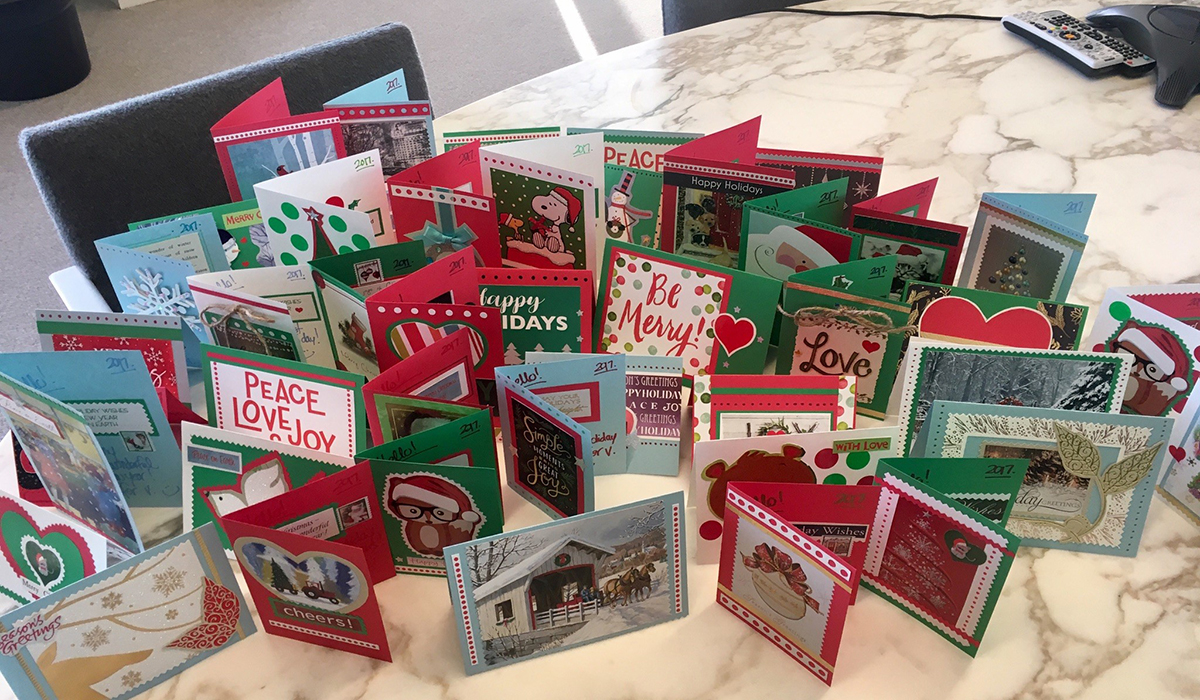Lifelong Volunteer Leads Thousands of Bank of America Employees for International Holiday Card Program

Meet Daily Point of Light Award honoree Jeanna Gaines. Read her story and nominate an outstanding volunteer or family as a Point of Light.
Volunteering has always been an integral part of Jeanna Gaines’ life. Growing up, she watched her parents be heavily involved in civic community events, and after starting her career at Bank of America in 1982, she has been an active part of their volunteer network. She even met her husband while they were mentoring first graders. Jeanna raised her children to be volunteers as well, bringing them along to trash cleanups and fundraising walks. After a life entwined with giving back to others, it’s no surprise that Jeanna is now the chair of two major volunteer programs.
Since 2010, Jeanna has served as the committee chair for the Bank of America Community Volunteers Hearts for the Holidays Campaign, which leads employees in creating holiday cards for those in need of cheer. Over the years, over 900,000 cards have been donated to hospitalized children, the elderly, first responders, overseas military members, veterans, and others. Jeanna serves as the self-described “cheerleader” and support system for the program’s team leads in about 100 cities. Additionally, Jeanna is the board chair for Transplants for Children, a nonprofit that supports transplant patients and their families that she has been involved with since 2003.

Describe your volunteer role with Hearts for the Holidays.
Hearts for the Holidays is a Bank of America community volunteer program that stared back in 2004 as a grassroots program in North Carolina. It was to make holiday cards for children in the hospital. They loved it, and the next year my manager who was in Charlotte asked me if I would like to do this and expand it to my city of San Antonio. The associates loved it. They love making cards. They can be creative. A lot of associates have families and they can’t go do walks or these other [volunteer activities], but this is something they can do with their children for the holidays. Within a couple years, I was selected to chair the national Hearts for the Holidays campaign and grow it so it would be a franchise-wide program. What I’ve been doing for the last ten or so years is expanding this campaign to reach all of our locations throughout the United States and overseas.
My role as a chairman is to work with team leads in each of the cities to get the word out, and work with the associates within their cities and their communities. They can get together and make the cards, gather the cards, and distribute them. It started out with just children in the hospital, but it has long since expanded. Now we’re including the elderly, first responders, the military, nonprofits like children’s shelters and women’s shelters, those sort of programs. Since 2004, the associates have made almost one million cards. It has really grown. My job is truly to work with others and build enthusiasm, and work with corporate leadership and market leaders, and talk about that programs so they can expand it and let people know it’s out there so associates can participate with their families.
How did the COVID-19 pandemic affect the program?
All of us were home, so it really changed this year, but our focus didn’t change. Recruiting was a little different and doing Christmas parties was a little different. We used our new technology, our Webex’s and Zoom calls, and we got together as teams so we could make cards in our homes with our families. We were able to do it that way and then gather it, mail or [bring it to] drop off points, and our team leaders gathered those cards and had them delivered. Even with the coronavirus and all of our medical restrictions and work-from-home situations, this year we were still able to make 29,000 cards. They were delivered to children’s hospitals, the elderly, homeless shelters, the United Way, the military. We even reached out to veterans. We did a special emphasis on the elderly who were shut in.
What kind of an impact do the cards have on the people receiving them?
Over the years, I have received so many letters of appreciation from hospitals, elderly care facilities, and even troops overseas, telling me how much the cards meant to them and how encouraged they were that we took the time to tell them they were thought of and they were cared for. It’s been a huge impact over the years. That’s what motivates me every year, that they are appreciated. We don’t know who’s going to get the cards — if it’s a child or a military person or an elderly person or a first responder — but no matter where they go, they always appreciate it.
How is Hearts for the Holidays expanding?
All this time, it has been something that I work on beginning in August to start recruiting and checking on my team leads, and having conversations with management and leadership teams across the franchise to let them know what’s going on and build enthusiasm. It’s really been a Christmas holiday activity. This year because of the impact it has had and the acknowledgment it’s getting, we are expanding it throughout the year. Associates now can make cards for Valentine’s Day. They can reach out to their elderly community any time of the year, and same with the troops. We’re going to do a Veterans Day event. We are reaching out to the homeless throughout the year. We are working with the food banks and providing cards in the boxes of food that are going out to people this year. It has completely expanded from where it was before and I’m excited about it.
Describe your volunteer role with Transplants for Children.
I’m a board chair for Transplants for Children, … a wonderful nonprofit organization that I’ve been a part of since 2003. Transplants for Children supports transplant patients and their families as they go through the transplant process. We support them every step of the way, from infancy to adulthood, and we provide their families with crisis funding and family support. We have support for their peers with our peer network. We support siblings with different activities. A transplant is a lifelong change. It’s not just, they get a transplant and they’re better. For the rest of their life, they are totally different. They feel different and they’re different from their peers, so we build support systems for them. We work with the hospitals for the youth coming in, we reach out to families, and we support them in so many different ways. We’ve been around since 1986, and I’ve been involved since 2003. Even with the COVID-19 pandemic, our program has gone virtual but they’ve expanded. We’ve been able to meet more patients and families who couldn’t get out and couldn’t come to events and couldn’t participate. We’ve been able to reach out to them so we’ve really expanded our program this year, and we’ve done really well even though we are a nonprofit during the pandemic.

What’s been the most rewarding part of your work?
I’ve really made lifelong friends with my volunteer activities. My parents were huge volunteers. They’re involved in lots of civic community events and have always been involved in that. Then as I’ve grown up and my children have grown up, they’ve gone to all the events and all the walks and all the trash cleanups and everything with us, and I see them carry that on in their adult lives now they’ve got children. That’s very encouraging for me. I met my husband 20 years ago while we were mentoring first graders at an elementary school. That’s probably one of the most amazing things to me, is that we’ve met during volunteering and our whole family has circulated around giving back to others.
Why do you think it’s important for others to give back?
It’s knowing that the time you spent doing something for others can mean so much more than the time that was spent. Whether it’s walking to raise money, whether it’s creating a blanket for a homeless person, whether it’s just making a card for a child in the hospital who is alone and scared, it’s time spent. Now in our virtual environment, there’s so many ways to find things to do at home with your family to encourage volunteerism throughout the generations. You show your kindness and love and include your family, and they’ll pass it on.
Do you want to make a difference in your community like Jeanna? Find local volunteer opportunities.
